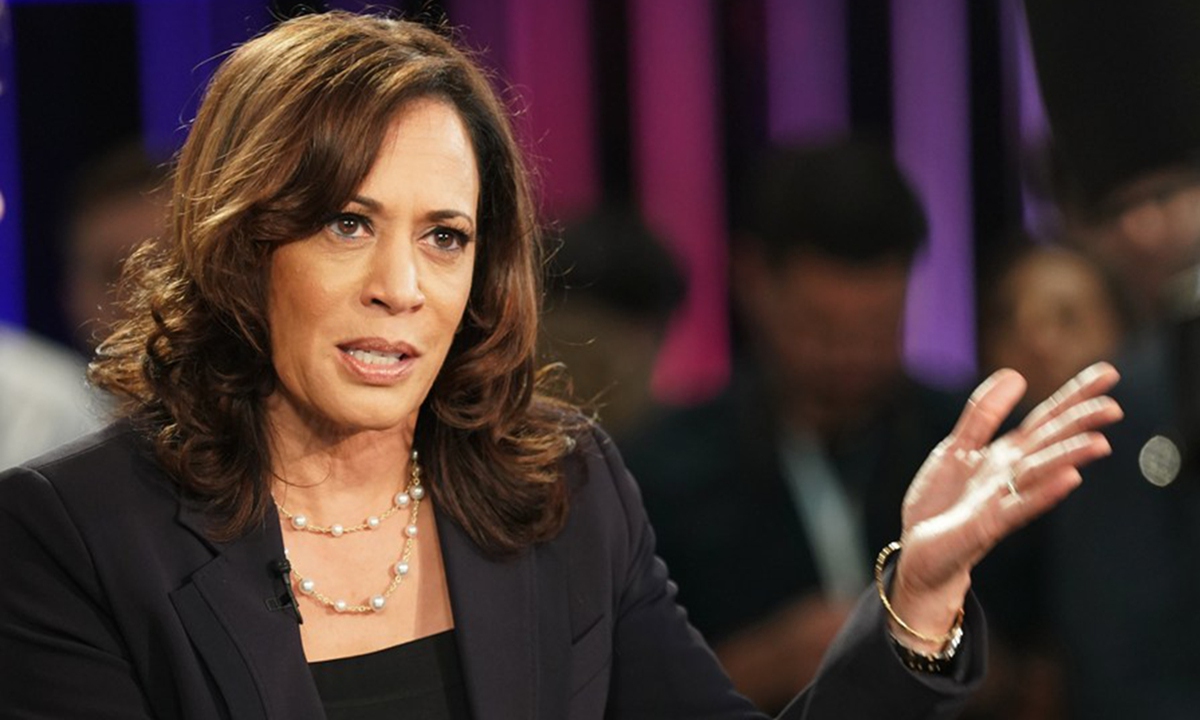Kamala Harris pick likely to deepen US racial polarization toward election
By Zhang Jiadong Source: Global Times Published: 2020/8/13 15:18:40

Senator Kamala Harris of California is interviewed after the second night of the first Democratic primary debate in Miami, Florida, the United States, on June 27, 2019. Photo: Xinhua
California Senator Kamala Harris has been chosen by Democratic presidential candidate Joe Biden to be his vice presidential running mateWith the Democratic vice presidential candidate finally decided, the Biden-Harris team is officially in place. This marks the start of the sprint phase of the US 2020 election.
Biden's decision was not only welcomed by former Democratic presidents Bill Clinton and Barack Obama, but also Obama's national security adviser Susan Rice, who was also a potential VP choice for Biden.
Harris has been chosen based on the following considerations. First, the agenda of race is key. Since US President Donald Trump took office, the issue of race in the US has intensified greatly with wild polarization. In this case, the Democratic Party's image as a minority representative plays an important role consolidating its campaign.
Harris is blessed with multiple characteristics of ethnic minorities. She has a Chinese name, He Jinli, which makes it easier to attract the support of Chinese voters, some of whom used to be in favor of the Republican Party because of the Democratic Party's policies on education and other issues. Harris' mother is from India and her father is an African American from Jamaica. Thus, she has the characteristics of major ethnic minorities. All these make her a symbol of multicultural integration in the US.
To win the support of female voters is the second reason. In 1984, Geraldine Ferraro was chosen by Walter Mondale as the vice presidential nominee, and in 2008 Sarah Palin was picked as John McCain's vice presidential running mate. Hillary Clinton took part in the 2016 election as a presidential candidate. Now, Harris is the fourth woman who has the chance to gain the highest position in the US. A woman entering the final round of the presidential election is of great significance and will attract female voters.
To complement Biden's political image serves another purpose. Biden is often regarded as a moderate politician and thus is often ridiculed by his opponents. By contrast, Harris has always been known for being tough in her political career. When she was California's attorney-general, Harris punished criminality ruthlessly, regardless of the suspect's racial background. As a senator, she held a key committee position and made outstanding performances in the fight against Trump. When she competed with Biden for the Democratic Party's presidential candidacy, she also showed an aggressive attitude. Harris' toughness is what Biden lacks. A mild and mature man with a young and aggressive woman constitutes a perfect match.
Meanwhile, choosing Harris as the vice president will compensate for Biden's age disadvantage. As a politician, Harris is very young - only 55 years old. Her joining can significantly reduce the average age of the team, and make Biden's team seem more vigorous than Trump's. This will increase Biden's appeal to young voters. At the same time, being young means she has made fewer political mistakes - this leaves Trump fewer chances to attack.
Harris' nomination will help Biden to establish an affectionate image. When announcing her nomination, Biden mentioned his late eldest son Beau Biden. In 2016, Biden gave up running for president largely because of the death of his son. In 2020, taking part in the presidential election again is, in a certain sense, a way to fulfill his son's last wish. All these undoubtedly make Biden into a loving father figure.
But still, Harris joining Biden's team brings complications for the Democratic ticket. Although Harris has minority characteristics, the question of her appeal to "Middle America" and identity politics looms. Some white voters may strengthen their sense of identity as the ethnic majority and distance themselves from the Democratic Party. This means that identity politics will be more prominent in the 2020 election. In the long run, political polarization based on ethnic identity is likely to become more wide-ranging in the US.
The author is professor at the Center for American Studies, Fudan University. opinion@globaltimes.com.cn
Posted in: VIEWPOINT